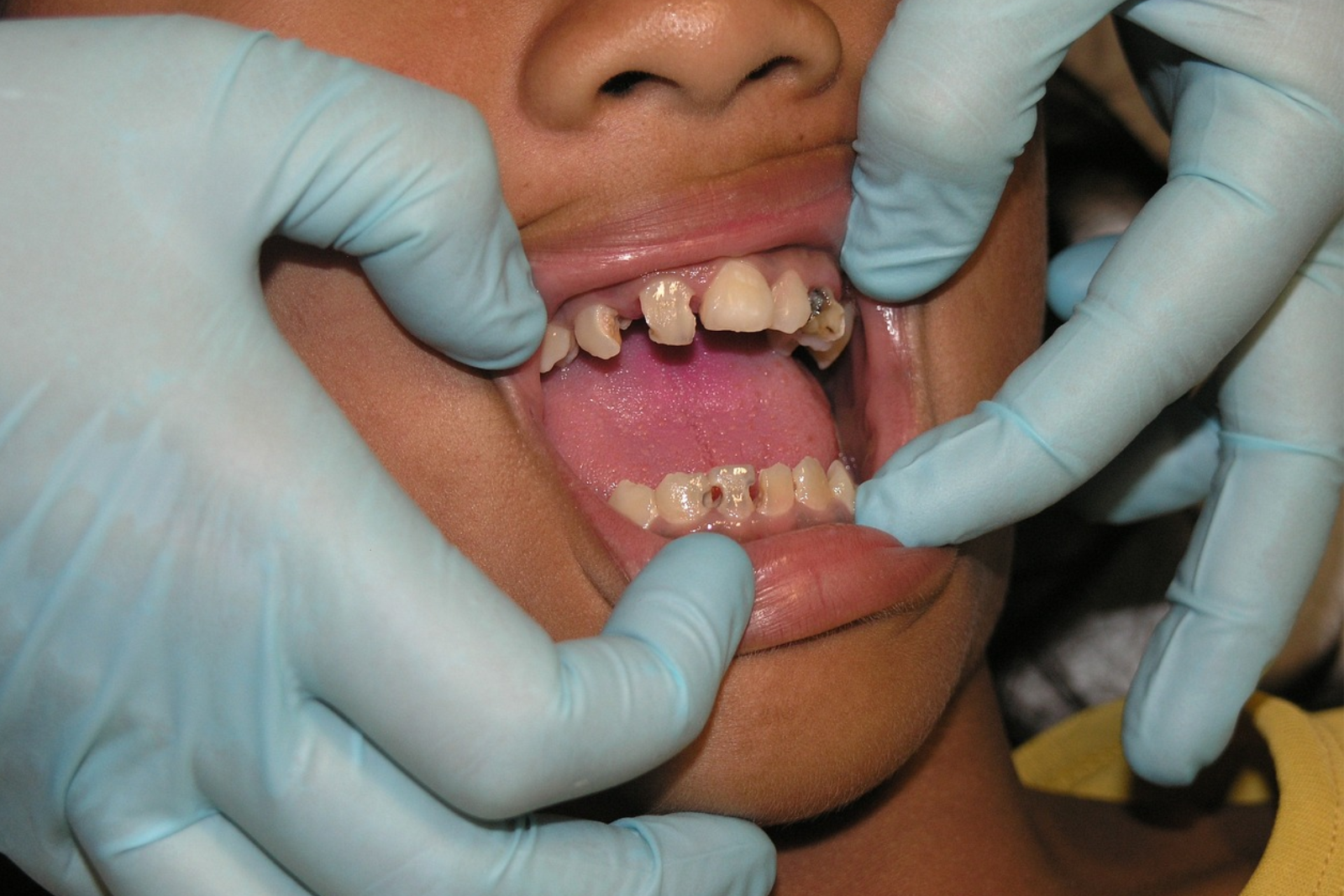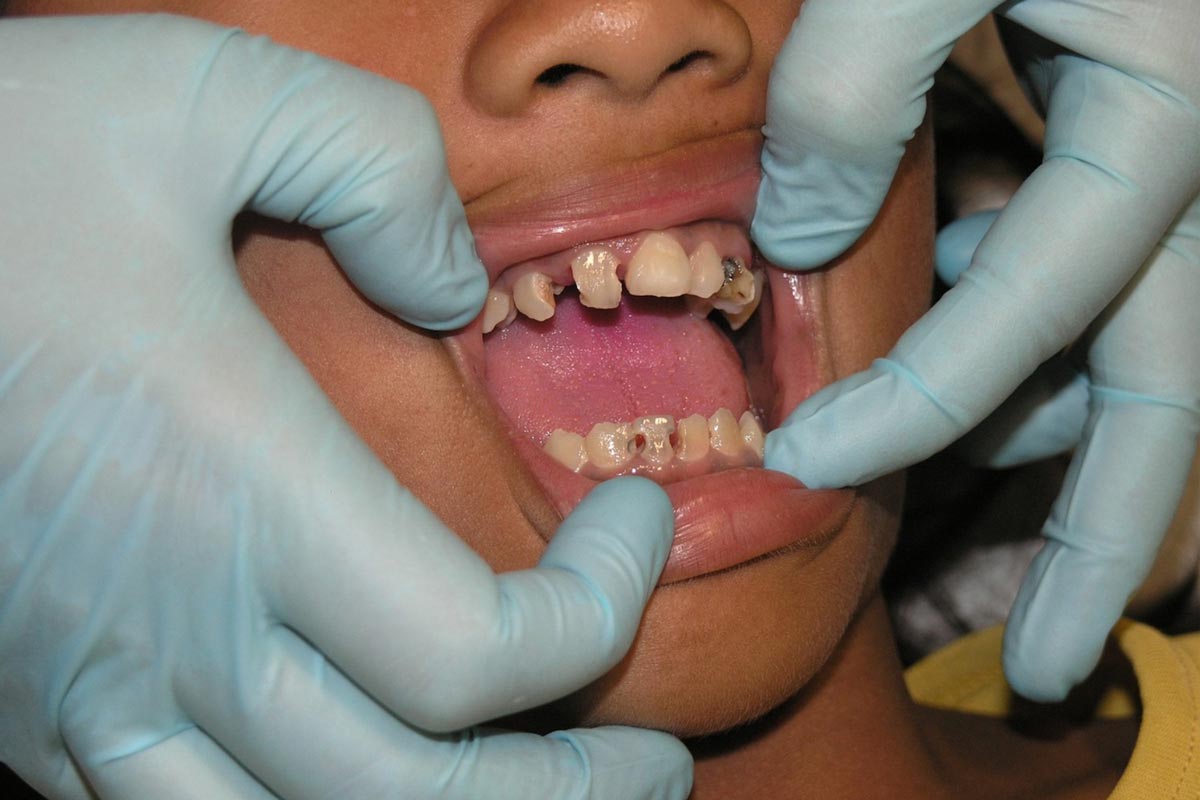What Is Meth Mouth? Causes, Statistics, and Effects

Key Points
- Meth is a highly addictive drug that has many adverse effects, including poor dental health.
- Meth mouth is a common term for the severe decay, gum disease, and tooth damage indicative of meth use.
- Meth mouth can range from stains, cavities, and gingivitis to severe gum disease, abscesses, and broken or lost teeth.
- There are many causes of meth mouth, including psychological factors like poor hygiene and drug-induced effects like dry mouth.
- Meth mouth, while severe, is not always irreversible, and treatments can restore some dental health.
- Treating meth mouth requires not only treating the teeth and gums but addressing the meth addiction to prevent further damage.
Methamphetamine, or meth, is a highly addictive stimulant that has many potential long-term effects, including stroke and permanent brain damage. It also has a devastating effect on dental health, leading to the term “meth mouth.”
Meth mouth is the result of acidic tooth decay and drug-induced physical changes that occur with meth use, leading to tooth decay, gum disease, and damaged or lost teeth.
What Is Meth Mouth?

Meth mouth is one of the most recognizable physical changes with long-term meth use. It includes severe gum disease and tooth decay, often causing the teeth to crack, break, or fall out.[1] The teeth of people who use meth chronically are often stained, rotting, crumbling, blackened, or falling apart.
The effects of meth mouth are caused by physiological damage, such as dry mouth and malnutrition, and drug-induced psychological effects, such as long periods of poor oral hygiene.
The signs of meth mouth can include:[2]
- Dry mouth
- Cracked teeth
- Loose teeth
- Missing teeth
- Lockjaw
- Carious lesions (micro-cavities)
- Gum disease
- Teeth grinding (bruxism)
- Black teeth
- Bad breath
Causes of Meth Mouth
Meth mouth is common with people who use meth, but it can have multiple causes.[3] People who are addicted to meth tend to neglect their hygiene, forgetting to brush their teeth for long periods. They also have poor nutrition habits and may go long periods without eating or combine sugary foods like sodas and candy with meth.
Smoking meth also contributes to cavities and tooth damage. Left untreated, this can cause abscesses, severe decay, and nerve damage. The stimulation from meth can cause teeth grinding or clenching that damages the enamel and weakens the teeth, making them easier to break or decay.
Some chemicals found in meth, such as drain cleaner, antifreeze, and battery acid, can corrode the teeth. Another factor is xerostomia, or intense dry mouth, which saps the saliva that’s crucial to wash away bacteria. Without eating a proper diet, the body’s ability to heal is impaired, which further affects dental health.
Statistics on Meth Mouth
According to a study in The Journal of the American Dental Association that examined the mouths of 571 people who use meth:[4]
- 96% had cavities
- 58% had untreated tooth decay
- 31% had six or more missing teeth
The study also found that the more meth a person used, the worse their tooth decay was. People over the age of 30, women, and cigarette smokers were more likely to have tooth decay and gum disease.
Other Effects of Meth
Aside from meth mouth, using meth can have short- and long-term adverse effects.
The short-term effects of meth include:[5]
- Shortness of breath
- Nausea
- Vomiting
- Diarrhea
- Hyperactivity
- Insomnia
- Decreased appetite
- Tremors
- Trouble breathing
The long-term effects of meth may include:[6]
- Irregular heartbeat
- Stroke
- High blood pressure
- Violent or aggressive behavior
- Confusion
- Anxiety
- Paranoia
- Hallucinations
- Delusions
What Are the Treatment Options for Meth Mouth?
The treatment for meth mouth depends on how severe the damage is. Meth mouth is irreversible, so the treatment is focused on repairing the damage and mitigating the effects.[7]
Depending on the level of damage and decay, people may need tooth extractions to remove unsavable teeth. Dental implants, bridges, or dentures may be necessary to reconstruct the mouth for a better appearance and function.
Less severe cases may need cavities filled or root canals to address decay, as well as treatment for mild, moderate, or severe gum disease. Gingivitis, the first stage of gum disease, can be reversed with proper oral hygiene. More severe gum disease causes permanent damage, such as gum recession, periodontal pockets around the teeth, and tooth and jawbone loss, so the focus is on mitigating the effects.[8]
Treating the Addiction
Treating the oral health effects of meth mouth is only part of the challenge. The addiction needs to be addressed to ensure that meth mouth doesn’t worsen and that the person has good oral hygiene moving forward.
Though stimulant withdrawal from drugs like meth isn’t usually life-threatening, it can be extremely unpleasant. The symptoms can vary but generally include:[9]
- Fatigue
- Anxiety
- Lack of energy
- Weight gain
- Irritability
- Dehydration
- Chills
- Insomnia
- Dysphoria
- The inability to think clearly
- Anhedonia (loss of the ability to feel pleasure)
- Social withdrawal
- Drug cravings
Many of the withdrawal symptoms subside over days or weeks, but cravings can last for long periods and increase the risk of relapse.
Medical Detox for Meth

Meth withdrawal management is key to clearing the drug from the body while managing the unpleasant symptoms of withdrawal. This involves a controlled, supervised setting with a medical team to monitor withdrawal symptoms, provide medications as needed, and prevent complications.
Once detox is complete, it’s highly recommended to enter an addiction treatment program in an inpatient or outpatient setting. Each treatment plan is individualized but may include a combination of individual therapy, group therapy, behavioral therapies, and holistic therapies. The goal of these treatment sessions is to address the underlying causes of addiction and develop better coping strategies and stress management techniques to support long-term abstinence.
Meth Addiction Treatment at Recovery Unplugged
If you or a loved one is struggling with meth addiction and its effects like meth mouth, don’t wait to get help. Recovery Unplugged offers a full spectrum of treatment facilities to manage withdrawal and address the behavioral aspects of addiction so you can find a healthier path forward. Contact us today to learn more about our treatment programs.
Frequently Asked Questions About Meth Mouth
Why Does Crystal Meth Rot Teeth?
Meth causes dry mouth, leading to tooth decay. Meth also intensifies cravings for sugary foods and causes people to neglect daily hygiene, including brushing and flossing their teeth. Tooth grinding and clenching also have a negative effect on the tooth enamel and exacerbate the damage.
Can Meth Mouth Be Fixed?
Meth mouth can cause extensive damage, but some effects can be reversed or significantly mitigated with treatment. Lost or severely decayed teeth can be extracted or treated and replaced with restorations like implants or dentures. After dental work, the key is stopping meth use and improving diet and oral hygiene habits.
How Long Does It Take to Get Meth Mouth?
Though meth mouth is more common with prolonged use, people can develop some of the oral hygiene issues associated with meth mouth within one year of regular use.
We take our music-focused treatment for addiction very seriously, so we are going to hold our content to the same precision standards. Recovery Unplugged’s editorial process involves our editing safeguard and our ideals. Read our Editorial Process.
Sources
[1] Meth Mouth. MouthHealthy. (n.d.). Retrieved from https://www.mouthhealthy.org/all-topics-a-z/meth-mouth on 2023, September 13.
[2] Meth Mouth. MouthHealthy. (n.d.). Retrieved from https://www.mouthhealthy.org/all-topics-a-z/meth-mouth on 2023, September 13.
[3] What is Meth Mouth? causes, symptoms & treatments – U.S. news & world … (n.d.-c). Retrieved from https://www.usnews.com/news/health-news/articles/2023-04-26/what-is-meth-mouth-causes-symptoms-treatments on 2023, September 13.
[4] Dental disease patterns in methamphetamine users. (n.d.-b). Retrieved from https://jada.ada.org/article/S0002-8177(15)00977-0/fulltext on 2023, September 13.
[5] U.S. Department of Health and Human Services. (2021, April 13). What are the immediate (short-term) effects of methamphetamine misuse?. National Institutes of Health. Retrieved from https://nida.nih.gov/publications/research-reports/methamphetamine/what-are-immediate-short-term-effects-methamphetamine-misuse on 2023, September 13.
[6] U.S. Department of Health and Human Services. (2022, January 12). What are the long-term effects of methamphetamine misuse?. National Institutes of Health. Retrieved from https://nida.nih.gov/publications/research-reports/methamphetamine/what-are-long-term-effects-methamphetamine-misuse on 2023, September 13.
[7] What is Meth Mouth? causes, symptoms & treatments – U.S. news & world … (n.d.-c). Retrieved from https://www.usnews.com/news/health-news/articles/2023-04-26/what-is-meth-mouth-causes-symptoms-treatments on 2023, September 13.
[8] Mayo Foundation for Medical Education and Research. (2023a, February 24). Periodontitis. Mayo Clinic. Retrieved from https://www.mayoclinic.org/diseases-conditions/periodontitis/symptoms-causes/syc-20354473#:~:text=Periodontitis%20(per%2De%2Do%2Ddon,but%20can%20usually%20be%20prevented on 2023,, September 13.
[9] Zorick, T., Nestor, L., Miotto, K., Sugar, C., Hellemann, G., Scanlon, G., Rawson, R., & London, E. D. (2010, October). Withdrawal symptoms in abstinent methamphetamine-dependent subjects. Addiction (Abingdon, England). Retrieved from https://www.ncbi.nlm.nih.gov/pmc/articles/PMC3071736/ on 2023, September 13.


